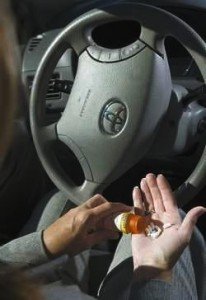Drugs prescribed to treat anxiety, depression and insomnia may increase patients’ risk of being involved in motor vehicle accidents, according to a recent study.
 The Taiwanese research, published in the British Journal of Clinical Pharmacology, compared medication use between individuals who had been in a motor vehicle accident and a group of age matched controls who had never been in a car accident. They found that people taking benzodiazepines, new sedatives such as zlopidem (Z-drugs) or antidepressants were more likely to be involved in a accident. While the risk of driving whilst taking benzodiazpines has been previously established, Z-drugs and antidepressants have not been so well characterised until this study.
The Taiwanese research, published in the British Journal of Clinical Pharmacology, compared medication use between individuals who had been in a motor vehicle accident and a group of age matched controls who had never been in a car accident. They found that people taking benzodiazepines, new sedatives such as zlopidem (Z-drugs) or antidepressants were more likely to be involved in a accident. While the risk of driving whilst taking benzodiazpines has been previously established, Z-drugs and antidepressants have not been so well characterised until this study.
The authors recommend that patients do not stop taking their medication, but if concerned should consult their doctor.
Our colleagues at the UK SMC collected the following expert commentary. Feel free to use these quotes in your reporting. If you would like to contact a New Zealand expert, please contact the SMC (04 499 5476; smc@sciencemediacentre.co.nz).
Professor David Taylor, pharmacist and Royal Pharmaceutical Society spokesperson on mental health said:
“Previous work in this area has linked benzodiazepines, Z Drugs and sedative antidepressants to the ability to think clearly and carry out complicated tasks and, in some cases, this has been linked to a greater risk of car accidents.
“This study suggests that the use of drugs which do not make you feel with drowsy, so called SSRI’s such as “Prozac” are linked to an increased risk of accidents. Confusingly the results of the research indicate that antipsychotics and antidepressants which do cause drowsiness such as “mirtazapine” do not increase the risk of accidents.
“Previous research has shown that SSRIs such as Prozac have no effect on driving ability, however we know that people who are clinically depressed can be at greater risk of having a car accident. It is not clear if the researchers have taken this and other factors into account. We should be very cautious about the conclusions we draw from this new research, however, if these results can be replicated they have very important implications for the prescribing of antidepressants.”
David Nutt, Professor of Neuropsychopharmacology, Imperial College London, said:
“Most of the findings presented in this study are not new, we have known for some time that certain psychotropic medications could affect driving. However, the lack of tolerance to the benzodiazepine effect is surprising and conflicts with much previous data. This particular effect may be accounted for by significant ethnic and locality differences in driving between the different countries studied across papers.”
Donald Singer, Member of the British Pharmacological Society and Professor of Clinical Pharmacology, University of Warwick said:
“Tsai and colleagues reported a ~35 -70% relative increase in risk of non-fatal driving accidents in Taiwan linked to prescription of a wide range of anti-depressants, benzodiazepines and newer Z-drug sleeping medicines. In their study, around 5200 people who had had motor accidents were compared with around 31,000 people with no history of accidents. The medicines appeared possibly linked to from 1 in 20, to 1 in 70 accidents, depending on the drug type. Obvious questions for pharmacologists, health professionals and the public are whether these findings are credible, and if so, generalisable to other parts of the world.
“This Taiwan report was based on a case-control study – more open to bias than randomized trials. Although the researchers matched controls for age, gender and year of the accidents, they provide no data on driving patterns. They were also unable to rule out differences in alcohol intake between the groups. Alcohol amplifies any impairment in concentration resulting from effects of drugs that act on the brain; and ethnic Taiwanese are commonly are intolerant of alcohol due to genetic lack of the enzyme needed to break down alcohol.
“It is also possible that the increased accident risk resulted from effects of underlying psychological or psychiatric disorders for which the drugs were prescribed e.g. through poorer concentration or indirectly through additional effects of sleep disturbance caused by the conditions under treatment or independent of the drugs. In addition the researchers noted that those who had accidents also had a higher burden of a range of non-psychiatric diseases, also recognized as increasing risk of accidents.
“What do these results mean for the UK population? Several of the drugs implicated in Taiwan are not used in the UK and there are several sources of bias indicating need for caution in interpreting the study. However other studies have stressed the need for caution when driving when using these types drugs. When these drugs are prescribed seek advice about risks of driving from their physician or pharmacist. In any event, patients on these drugs should avoid any alcohol when driving.”